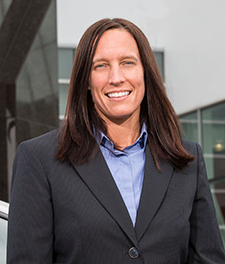By DAVID DUPONT
BG Independent News
The Bowling Green State University Police Department has become the first in Wood County, and one of the first in the area, to be certified for meeting new standards promulgated by the Ohio Collaborative Community-Police Advisory Board.
The department which had gotten provisional certification received its full certification after a recent site visit by the chief of the Coldwater police.
BGSU Police Chief Monica Moll said the new initiative was established to set best practices in police interactions with citizens.
The program, she said, is voluntary. All those who receive certification will be listed by the state. Most departments will want to make that list, Moll said.
Each year two standards will be added that departments have to meet.
This year the standards address equal opportunity in recruitment and hiring and policies on the use of force.

BGSU Police Chief Monica Moll (Photo provided by BGSU)
Moll said that her force had a leg up since it had just completed its Commission on Accreditation for Law Enforcement Agencies paperwork, which she described as “the gold standard” for law enforcement accreditation. The Bowling Green City Police Department also has CALEA accreditation, she said. The CALEA standards align with the best practices advocated by the Ohio Collaborative.
BGSU officers have to report any time they use force even if it’s only applying a wristlock. Every one of those reports, Moll said, is reviewed. The department also conducts an annual review of its use of force.
BGSU officers seldom use force, and it’s a low level of force, maybe tackling someone who is attempting to flee.
“We do a lot of training on de-escalation,” she said.
Officers must also report whenever they draw their weapons.
Officers working the midnight shift are more likely to use force, Moll said.
The standards also cover more severe uses of force, including using deadly force. That policy is guided by Constitutional guarantees and Supreme Court rulings. Officers can only use deadly force if their lives or the lives of others are threatened.
In addition, the BGSU department has policies pertaining to mental health calls. Officers receive 40 hours of training a year on alternatives to the use of force or arrest when dealing with a person suffering a mental health crisis.
The hiring standards require that the department spell out its procedures and standards ahead of time, so they are not change during the hiring process and that all communication to applicants is the same.
Departments have until March, 2017 to be certified in the first round.
Standards on the use of body cameras and on fostering positive community relations will be the focus for the next year. “The idea is to roll out a couple new standards each year,” Moll said.



